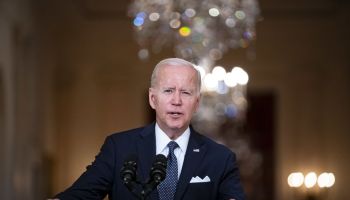Advocates for improved school nutrition hope the Healthy, Hunger-Free Kids Act of 2010, a bill cleared for a final vote by the Senate this past Wednesday, might pave the way for lunch programs across the country to replicate the success of a deliciously successful pilot project in Berkeley, California.
The School Lunch Initiative provides “delicious, healthy, freshly prepared meals using seasonal ingredients from sustainable farms to all of Berkeley’s public school students.” It grew from Uber-celebrity chef Alice Waters’ proposal to build a football field-sized garden at Martin Luther King Jr. Middle School. Waters is an authority on the locavore movement, which encourages the consumption of food that’s produced within a 100-mile radius.
“It’s an incredible program,” said Mark Coplan, spokesman for the Berkeley Unified School District. “We don’t use any frozen stuff at all. Even when you’re looking at pizza, you’re looking at really good stuff.”
The comprehensive program, established in 1995, includes free daily breakfast for all students; two representatives from each elementary school class roll a red wagon piled high with nine-grain muffins or breakfast focaccia back to their classrooms. Each school boasts a salad bar and lunch menus featuring dishes such as pear-glazed pork chops with white beans.
But Coplan says the program was designed to ward off accusations of elitism.
“We didn’t want something where people would say ‘well, they have all that organic food in Berkeley.’ We wanted this to be applicable to Tupelo, Mississippi.”
Thus far, Boulder, Colorado, is the only city to have adopted the program pioneered by Berkeley’s schools. Ann Cooper, who oversaw the initiative’s development, is now heading the effort in Boulder.
“[Cooper] was the only person who had the courage to say, ‘I don’t care if kids like plastic cheese, we’re not giving it to them’,” Coplan said.
Still, Coplan suspects other schools will soon follow. Parents regularly visit Berkeley’s dining facilities to gape at the rice bowl stations and tray-free, family-style service.
“They ask us how they can get this in their schools,” Coplan said. “The answer is you can’t if you don’t have a board that believes in it.”
A supportive school board helped pass a bond issue in 2000 and didn’t flinch when the program failed inspection its first year, Coplan said. With fresh food, he said, it’s harder to calculate the nutritional information mandated by state and federal guidelines.
“The state told us it would be easier to monitor if we used frozen food,” Coplan said. “We said, ‘Sorry. We know fresh is better.’
Read Full Story
Article courtesy cnn.com
















